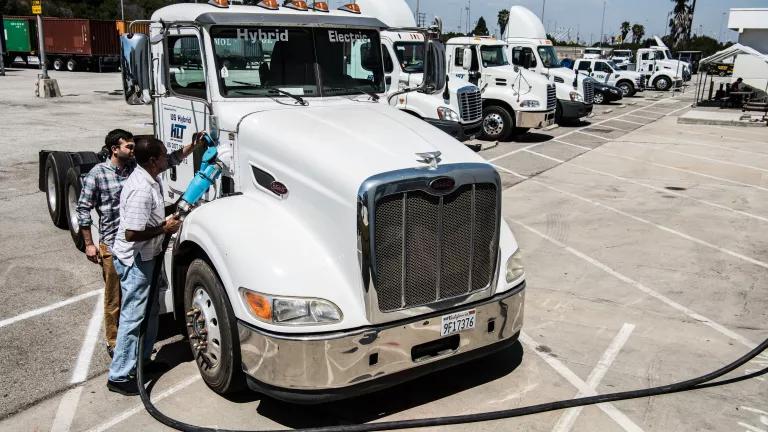New Jersey Leads the East Coast on Electric Trucks
New Jersey became the first state to announce plans to adopt the Advanced Clean Truck (ACT) and Heavy- Duty Omnibus rules

An electric car plugged into a charging station
This blog is the third in a series exploring the state of electric vehicle policy in New Jersey. The series takes a deep dive into the transportation electrification policies New Jersey will need to meet its ambitious climate laws. Together, they explore whether New Jersey needs more ambitious transportation electrification goals, the state’s existing plans to realize their goals, and the next steps New Jersey should take to decarbonize its transportation system. Ultimately, this blog series aims to holistically examine electrifying all segments of the transportation sector. Read the second blog here.
New Jersey is on the path to say goodbye to dirty trucks. Expanding on the July announcement that 100% electric truck and bus sales will be electric by 2050, the Garden State became the first state to announce plans to adopt the Advanced Clean Truck (ACT) and Heavy- Duty Omnibus rules—solidifying New Jersey’s commitment to reducing climate-changing pollution and improving air quality.
The adoption of these transformative and complementary clean truck standards was announced as part of the ongoing New Jersey Protecting Against Climate Threats (“PACT”) activities. The New Jersey Department of Environmental Protection will begin promulgating these regulations in April 2021 and starting in 2024, the state will begin to see more electric trucks on the road.
The two rules work in tandem: the ACT rule requires an increasing number of electric trucks to be sold in New Jersey, while the Omnibus rule cuts emissions from new diesel truck sales. By adopting these clean truck standards, New Jersey’s communities will become less polluted while signaling to vehicle manufacturers that the state wants a clean vehicle future.
This is especially true for communities of color and low-income communities that have disproportionately suffered from transportation pollution thanks to decades of racist and classist transportation policies. The ACT rule—endorsed by the New Jersey Environmental Justice Alliance—will improve human health by reducing dangerous pollutants found in fossil fuel vehicles, such as PM2.5 and NOx. By electrifying trucks, New Jersey will help ensure that all residents can breathe clean air regardless of skin color or tax bracket.
This announcement is groundbreaking, but more is needed to transition to a fully electric transportation sector. For example, utilities must play an important role by supporting electric truck charging infrastructure buildout, as well as developing electricity rates that encourage electric truck and bus adoption, save all electric customers money, and ensure electric vehicles maximize environmental and electric grid benefits.
New Jersey has ended 2020 on a high-note by solidifying its commitment to an electric truck future—now let’s make sure other East Coast leader states come along for the ride in 2021.




